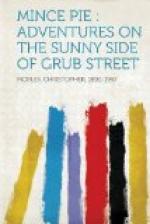Happily it was not burned. The Great Doctor never seemed so near to me as the other day when I saw a little notebook, bound in soft brown leather and interleaved with blotting paper, in which Bozzy’s busy pen had jotted down memoranda of his talks with his friend, while they were still echoing in his mind. From this notebook (which must have been one of many) the paragraphs were transferred practically unaltered into the Life. This superb treasure, now owned by Mr. Adam of Buffalo, almost makes one hear the Doctor’s voice; and one imagines Boswell sitting up at night with his candle, methodically recording the remarks of the day. The first entry was dated September 22, 1777, so Bozzy must have carried it in his pocket when Dr. Johnson and he were visiting Dr. Taylor in Ashbourne. It was during this junket that Dr. Johnson tried to pole the large dead cat over Dr. Taylor’s dam, an incident that Boswell recorded as part of his “Flemish picture of my friend.” It was then also that Mrs. Killingley, mistress of Ashbourne’s leading inn, The Green Man, begged Boswell “to name the house to his extensive acquaintance.” Certainly Bozzy’s acquaintance was to be far more extensive than good Mrs. Killingley ever dreamed. It was he who “named the house” to me, and for this reason The Green Man profited in fourpence worth of cider, 134 years later.
There is another day we have vowed to commemorate, by drinking great flaggonage of tea, and that is the 18th of September, Dr. Johnson’s birthday. The Great Cham needs no champion; his speech and person have become part of our common heritage. Yet the extraordinary scenario in which Boswell filmed him for us has attained that curious estate of great literature the characteristic of which is that every man imagines he has read it, though he may never have opened its pages. It is like the historic landmark of one’s home town, which foreigners from overseas come to study, but which the denizen has hardly entered. It is like Niagara Falls: we have a very fair mental picture of the spectacle and little zeal to visit the uproar itself. And so, though we all use Doctor Johnson’s sharply stamped coinages, we generally are too lax about visiting the mint.
But we will never cease to pray that every honest man should study Boswell. There are many who have topped the rise of human felicity in that book: when reading it they feel the tide of intellect brim the mind with a unique fullness of satisfaction. It is not a mere commentary on life: it is life—it fills and floods every channel of the brain. It is a book that men make a hobby of, as golf or billiards. To know it is a liberal education. I could have understood Germany yearning to invade England in order to annex Boswell’s Johnson. There would have been some sense in that.
What is the average man’s conception of Doctor Johnson? We think of a huge ungainly creature, slovenly of dress, addicted to tea, the author of a dictionary and the center of a tavern coterie. We think of him prefacing bluff and vehement remarks with “Sir,” and having a knack for demolishing opponents in boisterous argument. All of which is passing true, just as is our picture of the Niagara we have never seen; but how it misses the inner tenderness and tormented virtue of the man!




